
Real-life CSI: What life and work are like as a forensic pathologist, and what to expect from the degree
The reality of attending scenes of death, and how these medical experts deal with the emotional side of the job
You've probably watched your fair share of crime TV shows and movies, where forensic doctors perform and autopsy, and the cops solve a murder case. But this isn't quite what the job is like in real life.
Dr Philip Beh has spent the past 38 years working as a forensic pathologist in Hong Kong, and he says that doctors like him actually play a far bigger role in solving crimes in real life than you see on TV.
For a start, his work is not confined to the autopsy room. “Crime series rarely show the forensic doctor being one of the first people to get to the scene of the death,” Beh says. But in reality, pathologists begin by examining the body at the scene. This allows them to estimate how long the person has been dead, which will be crucial evidence if the person has been murdered, and to look for possible clues as to the cause of death.
To qualify as a forensic pathologist, a student will have to get into medical school and study for six years, then do one year of compulsory paid internship; after that, it’s a minimum of six years to qualify as a specialist forensic pathologist.
Once qualified, forensic doctors work normal office hours but will also take turns to be “on call” after hours to answer queries from police, to attend scenes of death and to examine victims of violence and other crimes.
Beh says: “When I attended lectures about forensic pathology in med school, the lecturers were so different from the ones we normally had for medicine; they discussed all sorts of criminal weaponry, drugs, guns ... which was very exciting and interesting.”
A forensic pathologist also has to be patient and committed to finding answers. It’s not like on TV when you get all the answers in an hour, he says. “We actually refer to this as the CSI effect,” he says, referring to incidents when people believe all pathological work will be fast and automatically give investigators all the answers.
“Here in Hong Kong, we don’t have all the equipment seen on CSI, because some of it is extremely expensive. That being said, more of the equipment is gradually becoming available for us to use, which is good!”

The job can be quite draining. Beh handles the heavy emotions caused by being surrounded by death all the time by making a clear distinction between work and life. “An analogy is that it is like a nurse dealing with crying babies all the time; you cannot view a crying baby at home in the same way,” he says.
Even though he frequently finds himself in sad situations, he says: “One needs to be very aware that you are doing something good by helping to give answers.”
The job comes with other challenges. In some cases, the grieving family may not want an autopsy at all. “It then becomes a tussle between us, the family, and the coroner,” Beh says. Even if an autopsy is performed, there is never a guarantee that the cause of death will be found. “If there are no physical changes identified during the autopsy, we cannot speculate,” he says.
“Sometimes, even when I do find something, I am unable to explain why it led to the death.”
Beh had to accept early on that he wouldn’t always be able to give all the answers. “I used to feel like I’d failed to do my job. But I learned to look at it this way: at least I’ve excluded a lot of different things that I know did not lead to the death.”
The satisfaction of finding answers makes it all worthwhile. “It is a way to provide closure for the grieving family,” he says.
When he is not helping the police, Beh does research as part of the University of Hong Kong’s department of pathology. “Of course, there is also the excitement of occasionally seeing very unusual things like rare diseases that you only see in textbooks.”
The job can throw you into very unexpected situations. Thirty years ago, Beh dealt with a case that involved someone who was killed while sitting in the lounge watching TV, when a double- decker bus crashed into the house.
But years of experience in this field have changed the way Beh sees life. “There are so many things that are unplanned. It’s important that we all learn to live day by day. Why worry about everything so much?”
This article was curated in conjunction with Young Post.
